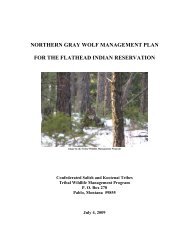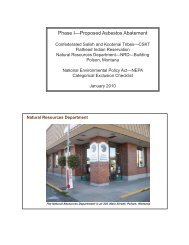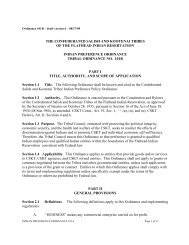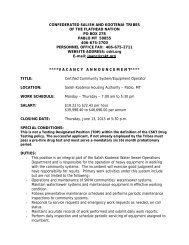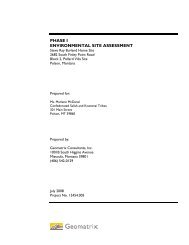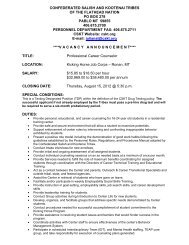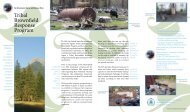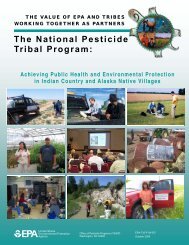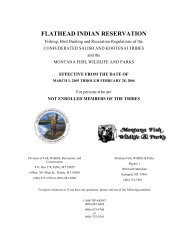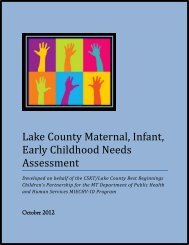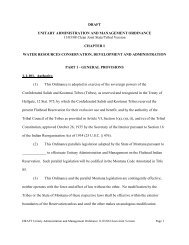2006 annual report - cskt - Confederated Salish and Kootenai Tribes
2006 annual report - cskt - Confederated Salish and Kootenai Tribes
2006 annual report - cskt - Confederated Salish and Kootenai Tribes
Create successful ePaper yourself
Turn your PDF publications into a flip-book with our unique Google optimized e-Paper software.
<strong>Confederated</strong> <strong>Salish</strong> <strong>and</strong> <strong>Kootenai</strong> <strong>Tribes</strong>’ Annual Repor t <strong>2006</strong><br />
10<br />
<strong>Salish</strong> <strong>Kootenai</strong> College<br />
<strong>Salish</strong> <strong>Kootenai</strong> College started in 1977 in an<br />
ab<strong>and</strong>oned public school in Pablo. The campus<br />
was moved several times prior to locating to<br />
its present site east of Pablo, 10 miles south<br />
of Flathead Lake. Today, SKC has 48 modern<br />
buildings occupying over 203,000 square feet,<br />
situated on 135 contiguous acres. The value of<br />
the property exceeds $25 million.<br />
During the 2005-06 academic year, <strong>Salish</strong><br />
<strong>Kootenai</strong> College enrolled an unduplicated<br />
headcount of 1,743 students comprising 1,097<br />
FTEs, 823 of which were generated by members<br />
of 107 federally recognized tribes. A total of 194<br />
degrees were awarded to <strong>2006</strong> graduates, the<br />
largest graduating class in the college’s history.<br />
Of these, 73 percent, were Native Americans.<br />
Of the Native American graduates, 75 percent<br />
were from the <strong>Confederated</strong> <strong>Salish</strong> <strong>and</strong> <strong>Kootenai</strong><br />
<strong>Tribes</strong>.<br />
<strong>Salish</strong> <strong>Kootenai</strong> College offers comprehensive<br />
student support services, including recruitment<br />
<strong>and</strong> retention programs, financial aid,<br />
scholarships, 19 academic labs with 190<br />
personal computers, tutoring, personal <strong>and</strong><br />
career counseling, job placement, student<br />
housing, Adult Learning Center, Child Care<br />
Center, cafeteria, a new fitness center, <strong>and</strong><br />
numerous student organizations, clubs, <strong>and</strong><br />
activities. Student housing consists of 24<br />
buildings with 55 living units comprising 58,128<br />
square feet with a capacity of 258 persons.<br />
During Fall Quarter 2005, the College employed<br />
a total of 198 full-time faculty <strong>and</strong> staff members.<br />
Of these, 57 percent were Native American, 54<br />
percent were female <strong>and</strong> 46 percent were male.<br />
Of 101 faculty members, 61were fulltime <strong>and</strong><br />
40 served part-time. The average class size for<br />
2005-06 was 25 students.<br />
<strong>Salish</strong> <strong>Kootenai</strong> College offers six bachelor<br />
degree programs, nursing, business/<br />
entrepreneurship, information technology,<br />
forestry, social work <strong>and</strong> environmental<br />
science; 14 associate degree programs <strong>and</strong><br />
seven certificate programs including highway<br />
construction training, medical officer clerk <strong>and</strong><br />
dental assisting technology.<br />
Kicking Horse Job Corps Center<br />
Kicking Horse Job Corps Center is the longestrunning<br />
federally-contracted program operated<br />
by CSKT. Through a contract with the U.S.<br />
Department of Labor since November 1970, the<br />
center has served as an all-Native American<br />
vocational training center for 224 students aged<br />
16 to 24.<br />
Its operating budget for the last program year<br />
was $4.8 million <strong>and</strong> it employed 70 FTE’s,<br />
54 of whom were CSKT members. A total of<br />
299 students were served (including six CSKT<br />
members <strong>and</strong> two CSKT descendants) of which<br />
174 completed vocation programs, 53 received<br />
General Equivalency Diplomas (GED’s), <strong>and</strong> six<br />
received high school diplomas.<br />
Kicking Horse Job Corps has been accredited by<br />
the Northwest Association of Accredited Schools<br />
since 1983 <strong>and</strong> has received <strong>annual</strong> accolades<br />
for excellence in quality of programs.<br />
Kicking Horse Job Corps has maintained a close<br />
working relationship with the <strong>Salish</strong> <strong>Kootenai</strong><br />
College <strong>and</strong> Two Eagle River High School.<br />
The Center’s High School Diploma Program is<br />
earned through Two Eagle River School. At SKC,<br />
Kicking Horse students can earn a Life Skills<br />
Certificate for completion of a 45-credit program<br />
of studies.<br />
The Mission Valley Community benefits from the<br />
skills students learn in Kicking Horse Vocational<br />
programs like heavy equipment operation,<br />
carpentry construction, facilities maintenance,<br />
business technology, medical assistant, dental<br />
assistant, forestry technician, diesel mechanics,<br />
<strong>and</strong> culinary arts. In <strong>2006</strong>, the value of projects<br />
accomplished by the Center was valued at over<br />
$100,000 <strong>and</strong> included road work, excavation,<br />
building renovation, construction of park <strong>and</strong><br />
campground equipment, fencing, debris cleanup,<br />
<strong>and</strong> assisting with tribal cultural events <strong>and</strong><br />
activities.





